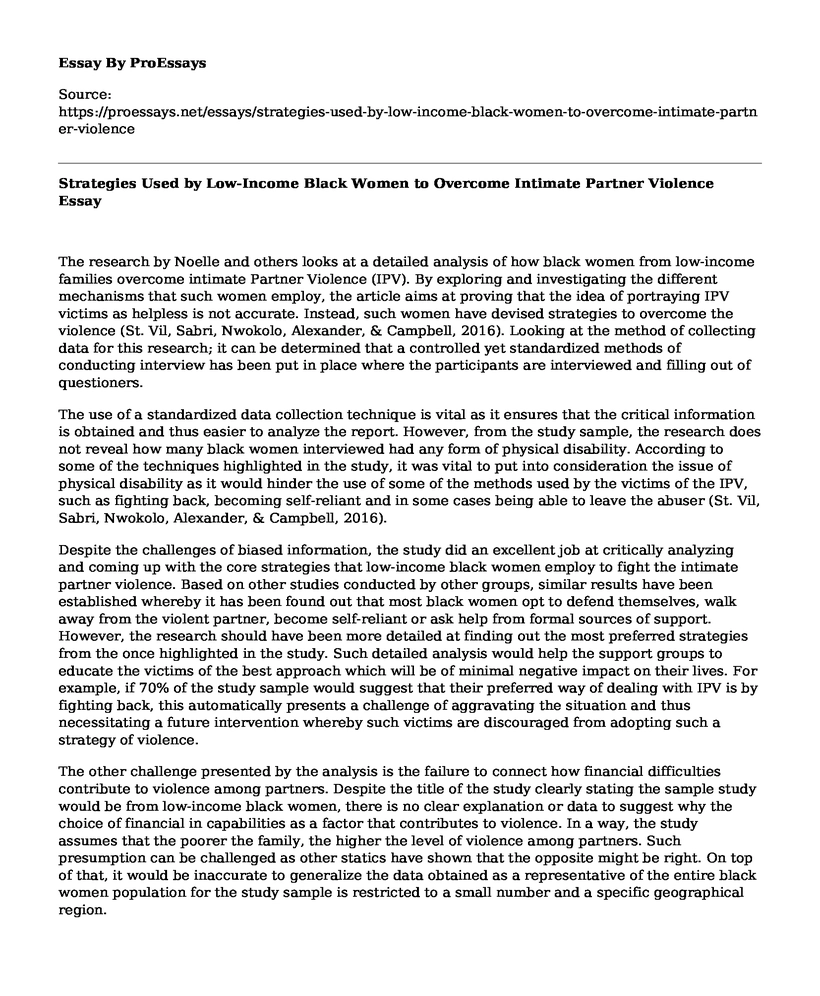The research by Noelle and others looks at a detailed analysis of how black women from low-income families overcome intimate Partner Violence (IPV). By exploring and investigating the different mechanisms that such women employ, the article aims at proving that the idea of portraying IPV victims as helpless is not accurate. Instead, such women have devised strategies to overcome the violence (St. Vil, Sabri, Nwokolo, Alexander, & Campbell, 2016). Looking at the method of collecting data for this research; it can be determined that a controlled yet standardized methods of conducting interview has been put in place where the participants are interviewed and filling out of questioners.
The use of a standardized data collection technique is vital as it ensures that the critical information is obtained and thus easier to analyze the report. However, from the study sample, the research does not reveal how many black women interviewed had any form of physical disability. According to some of the techniques highlighted in the study, it was vital to put into consideration the issue of physical disability as it would hinder the use of some of the methods used by the victims of the IPV, such as fighting back, becoming self-reliant and in some cases being able to leave the abuser (St. Vil, Sabri, Nwokolo, Alexander, & Campbell, 2016).
Despite the challenges of biased information, the study did an excellent job at critically analyzing and coming up with the core strategies that low-income black women employ to fight the intimate partner violence. Based on other studies conducted by other groups, similar results have been established whereby it has been found out that most black women opt to defend themselves, walk away from the violent partner, become self-reliant or ask help from formal sources of support. However, the research should have been more detailed at finding out the most preferred strategies from the once highlighted in the study. Such detailed analysis would help the support groups to educate the victims of the best approach which will be of minimal negative impact on their lives. For example, if 70% of the study sample would suggest that their preferred way of dealing with IPV is by fighting back, this automatically presents a challenge of aggravating the situation and thus necessitating a future intervention whereby such victims are discouraged from adopting such a strategy of violence.
The other challenge presented by the analysis is the failure to connect how financial difficulties contribute to violence among partners. Despite the title of the study clearly stating the sample study would be from low-income black women, there is no clear explanation or data to suggest why the choice of financial in capabilities as a factor that contributes to violence. In a way, the study assumes that the poorer the family, the higher the level of violence among partners. Such presumption can be challenged as other statics have shown that the opposite might be right. On top of that, it would be inaccurate to generalize the data obtained as a representative of the entire black women population for the study sample is restricted to a small number and a specific geographical region.
Conclusion
In conclusion, the study presents a framework which future studies should expand on in the quest of determining how black women cope with the issue of intimate partner violence. The information presented is crucial and should form a basis for a future more detailed, more comprehensive research that will give a more substantial and accurate data. Based on the study, the information narrows down on a small study sample, and thus some inaccuracies might be seen if the findings from the study were to be used on a larger population.
References
St. Vil, N. M., Sabri, B., Nwokolo, V., Alexander, K. A., & Campbell, J. C. (2016). A Qualitative Study of Survival Strategies Used by Low-Income Black Women Who Experience Intimate Partner Violence. Social Work, 62(1), 63-71. doi:10.1093/sw/sww080
Cite this page
Strategies Used by Low-Income Black Women to Overcome Intimate Partner Violence. (2022, Jun 20). Retrieved from https://proessays.net/essays/strategies-used-by-low-income-black-women-to-overcome-intimate-partner-violence
If you are the original author of this essay and no longer wish to have it published on the ProEssays website, please click below to request its removal:
- Essay Sample on Hate Crime on Campus
- Essay Example on Merging Firms: Communication Crucial to Avoiding Misunderstandings
- Essay Sample on Hate Crimes: Prejudice, Targets & Bias Incidents
- Essay Example on Online Dating: Seeking Long-Term Relationships?
- Test Case: Plessy v Ferguson (1896) - Legalizing Jim Crow Laws - Essay Sample
- Essay Example on Journey to Self-Identity: Amy Tan's A Pair of Tickets
- Article Review Sample on Culture, Power & Hegemony: Gramsci's Influence on Lear's Argument







